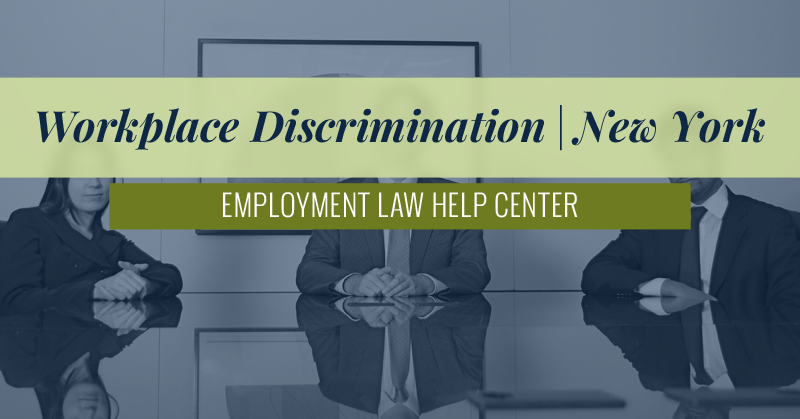New York Employment Discrimination
There are laws on both the federal and state level that prohibit employment discrimination in New York, which includes employers firing, refusing to hire, failing to promote, retaliating against, or otherwise unfairly treating employees based on their membership in a legally protected class, such as race, gender, national origin, age or religion. If you believe you have been the victim of workplace discrimination in New York, contact an experienced employment law attorney today to discuss your legal options. You may have grounds to file a discrimination lawsuit against your employer, in order to get your job back, negotiate a severance package, recover damages for lost wages, or take other legal action.

Laws Against Discrimination in the Workplace
In all 50 states, there are federal laws in place that make it illegal for employers to discriminate against employees based on the following protected classes: race, color, religion, national origin, citizenship status, age (40 and older), sex (including childbirth, pregnancy, and related medical conditions), genetic information, and disability. In addition to these protected classes, laws on the state level in New York prohibit workplace discrimination based on: marital status, sexual orientation, political activities, military status or service, criminal accusation, use of a service dog, domestic violence victim status, lawful use of any product or lawful recreational activities when not at work, age (18 and older), and observance of Sabbath
Under federal law, companies with 15 or more employees are subject to Title VII, the main law that prohibits employment discrimination, the Americans with Disabilities Act, which makes it unlawful to discriminate on the basis of disability, and the Genetic Information Nondiscrimination Act, which prohibits discrimination on the basis of genetic information. Companies with 20 or more employees are also subject to the Age Discrimination in Employment Act (ADEA), the federal law prohibiting discrimination against employees aged 40 and older. Companies with four or more employees are also required to comply with the Immigration Reform and Control Act, which prohibits discrimination based on citizenship status. All companies, regardless of size, are subject to the Equal Pay Act, which ensures that men and women are paid equally for doing equal work. In New York, companies with four or more employees are also subject to the state’s anti-discrimination law.

Types of Workplace Discrimination in NY
There are a number of ways in which employers may unlawfully discriminate against members of a protected class in the workplace, including the following:
- Refusing to hire
- Failing to promote
- Discharging from employment (wrongful termination)
- Sexually harassing an employee (sex discrimination)
- Retaliating against an employee (for filing a complaint or acting as a whistleblower)
- Unfairly offering privileges to certain employees, but not others
- Paying certain employees more than others, based on their sex
An Experienced Employment Law Attorney Can Help
The Equal Employment Opportunity Commission (EEOC) is the federal agency that regulates discrimination in the workplace, and the Division of Human Rights enforces state anti-discrimination laws in New York. However, some state and federal discrimination laws overlap, and employees filing a lawsuit for workplace discrimination in New York may actually have a claim under more than one anti-discrimination law, which is why it’s best to hire an experienced attorney to help walk you through your case. For example, because equal pay claims often involve sex discrimination, workers who have a claim under the Equal Pay Act may also have a sex discrimination claim under Title VII of the Civil Rights Act. Consult a knowledgeable employment law attorney today if you believe you have been the victim of workplace discrimination in New York.




